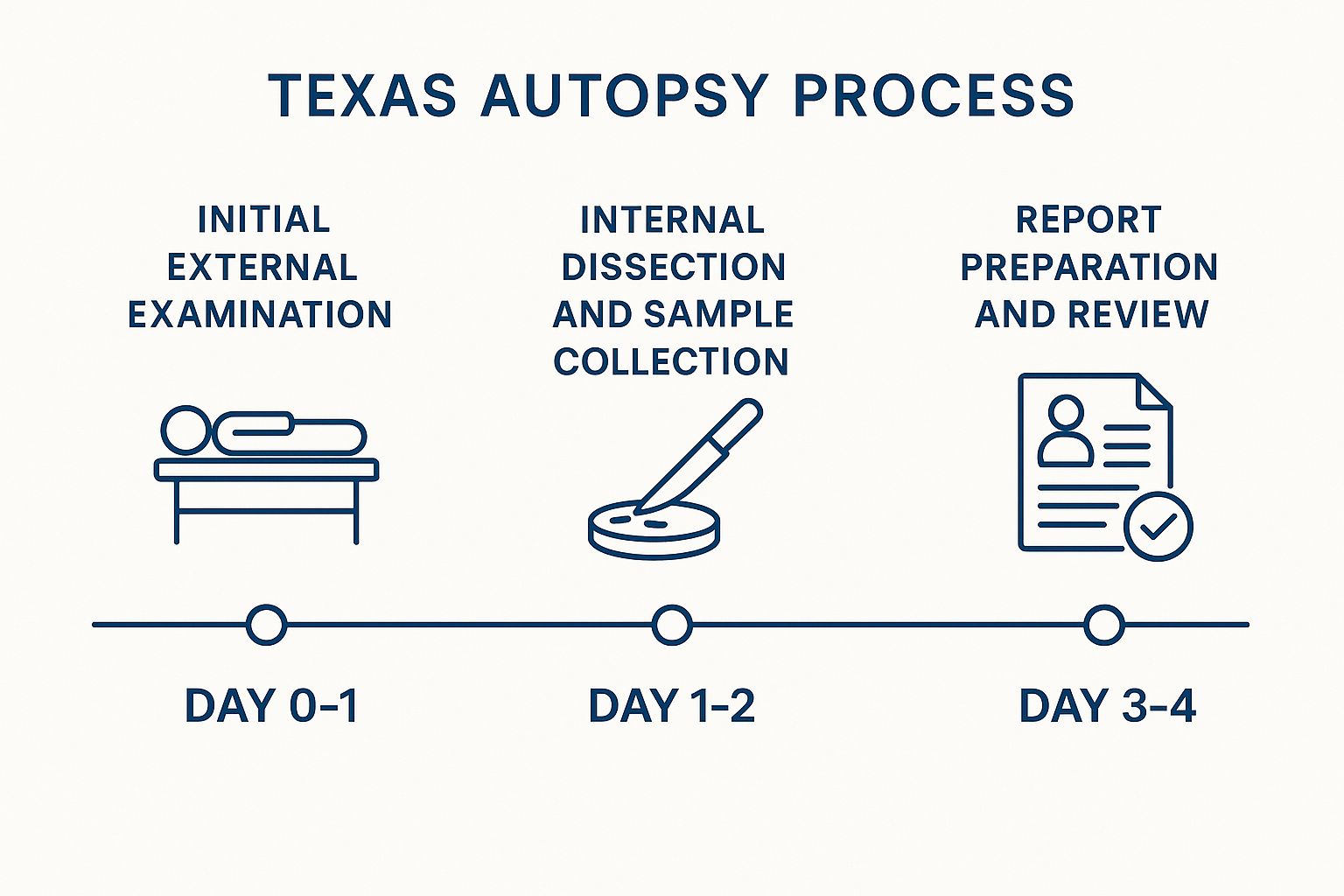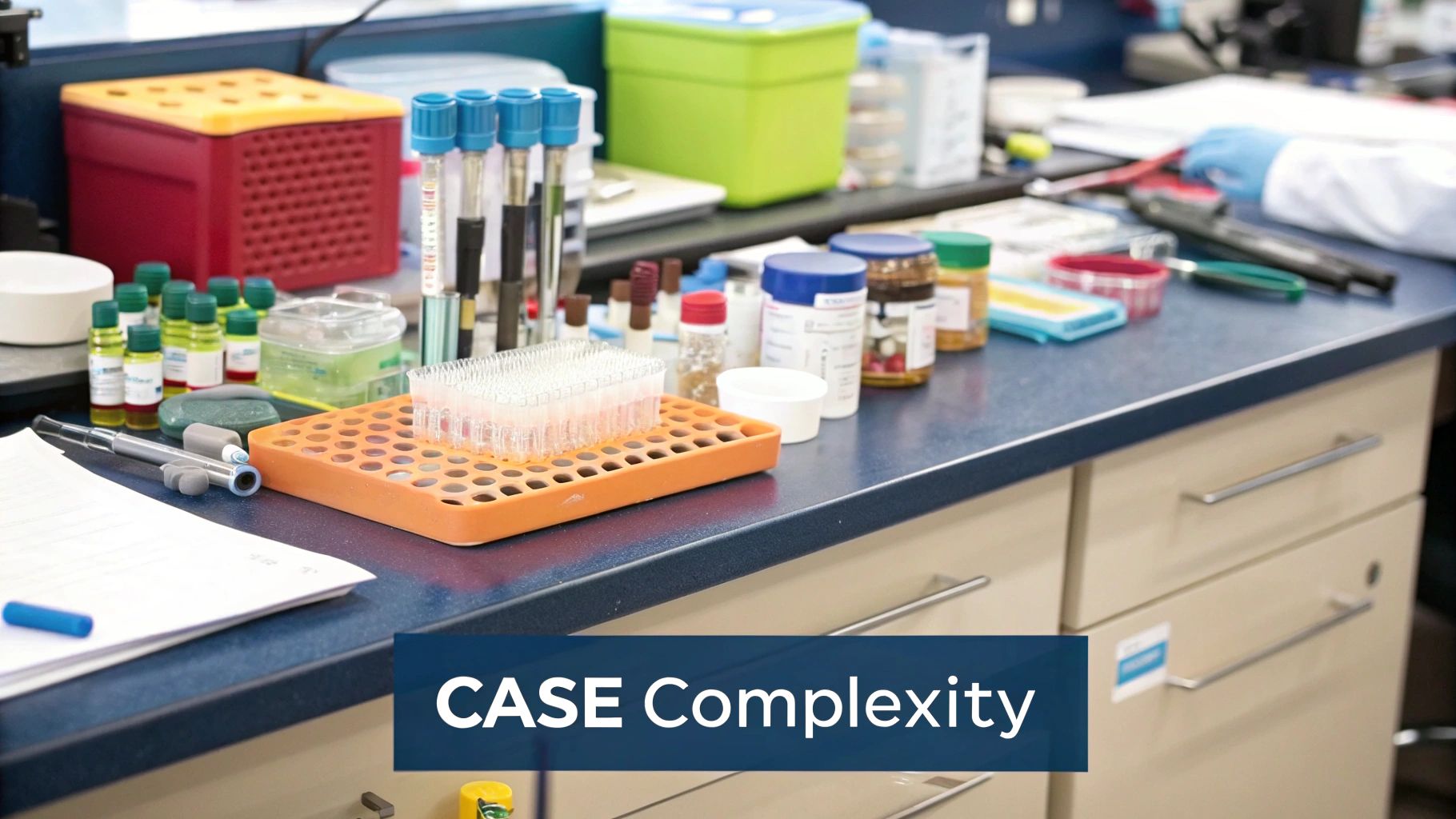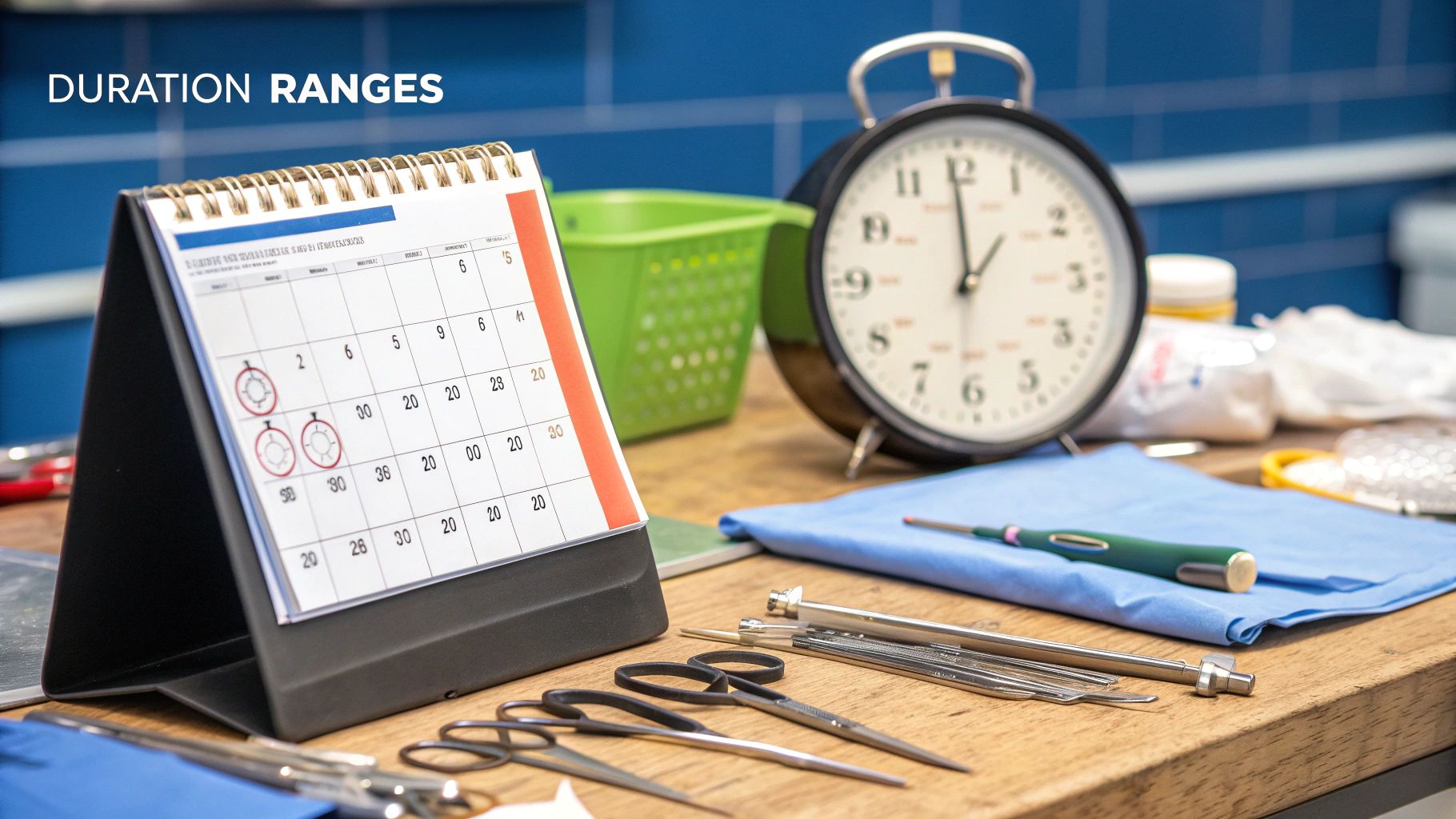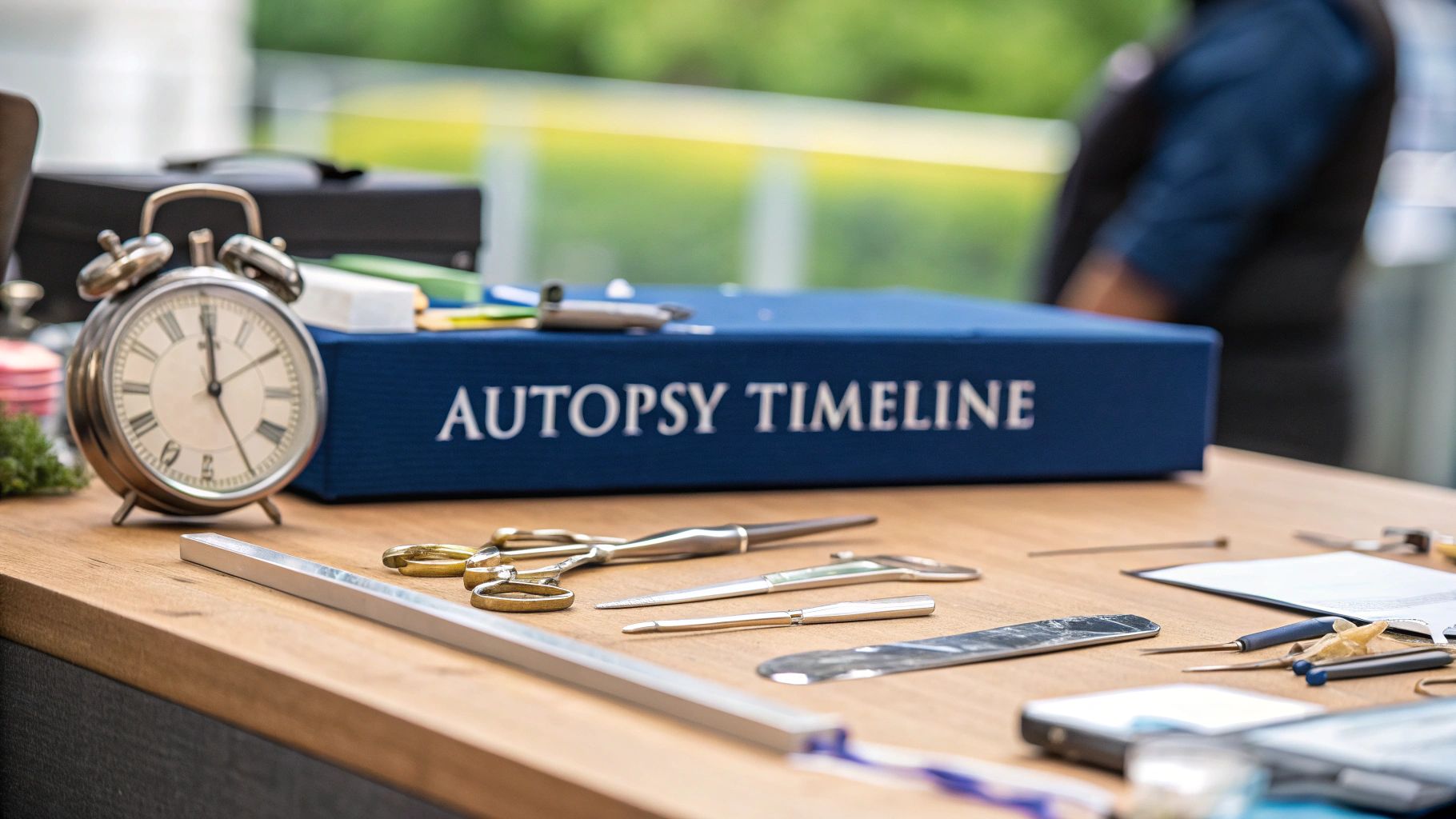TL;DR: The physical examination for an autopsy in Texas is typically completed within 2–4 hours. However, the final, comprehensive report often takes 6–12 weeks, and sometimes longer, due to extensive laboratory testing.
- Physical Exam: The hands-on portion is quick, usually lasting 2–4 hours.
- Preliminary Findings: A preliminary report may be available within 24–72 hours.
- Lab Testing: Specialized tests like toxicology and histology are the main cause of delay, often taking 4–10 weeks or more.
- Final Report: The complete, official report is generally issued in 6–12 weeks, but complex cases can extend this timeline to six months or longer.
Navigating the loss of a loved one is an incredibly challenging experience, and the period of waiting for answers can add to the emotional strain. It is a common misconception that an autopsy is a single, brief event. While the physical examination itself is often concluded within a few hours, the comprehensive analysis required to produce a final, official report is a much more extensive process. Understanding this timeline can help set realistic expectations during a difficult time.
This guide provides a factual overview of the autopsy timeline in Texas, from the initial examination to the final report. Please note this information is for educational purposes only and does not constitute medical or legal advice.
Understanding the Texas Autopsy Timeline
An autopsy is best understood not as a single procedure, but as a detailed forensic investigation. The hands-on examination is only the first step. The majority of the time is dedicated to in-depth analysis that occurs behind the scenes.
This timeline offers a visual breakdown of the typical phases in an autopsy process within Texas.

As illustrated, the physical examination and collection of specimens are completed relatively quickly, often within the first 48 hours. The subsequent specialized laboratory work and final report compilation are what extend the overall timeline.
Key Stages of the Autopsy Process
The entire process is systematically broken down into three main phases:
- The Physical Examination: This is the phase most people envision when they think of an autopsy. A board-certified forensic pathologist conducts a thorough external and internal examination of the body. This stage is prioritized to allow families to proceed with funeral arrangements without unnecessary delay.
- Laboratory Analysis: This is typically the longest stage. Tissue samples, bodily fluids, and other specimens are sent to specialized laboratories. These facilities perform analyses such as toxicology (to detect the presence of drugs, alcohol, or other chemicals) and histology (the microscopic examination of tissues).
- Final Report Compilation: Once all laboratory results have been received, the pathologist integrates and analyzes all findings. They then compile a single, comprehensive report that officially documents the cause and manner of death.
To provide a clearer picture, here is a general overview of the expected timeline for each part of the process.
Estimated Texas Autopsy Timeline At a Glance
| Autopsy Stage | Typical Timeframe |
|---|---|
| Physical Examination | 2-4 hours (usually completed within 24-48 hours of the body's arrival) |
| Preliminary Report | Often available within 24-72 hours |
| Toxicology & Lab Testing | 4-10 weeks (can be longer in complex cases) |
| Final Autopsy Report | Typically 6-12 weeks, but can take 6 months or more |
It is important to recognize that these are estimates. Each case is unique, and the timeline can be influenced by a number of factors.
The Initial Physical Examination Process

The autopsy process begins with the physical examination. This is a careful, respectful, and methodically efficient procedure. While families may imagine this portion taking a long time, the hands-on phase is typically completed in just two to four hours.
This examination is vital for gathering the initial evidence and observations. It is divided into two main parts: an external examination of the body, followed by an internal examination. The forensic pathologist systematically documents all physical details, from identifying marks to any signs of injury, and records precise measurements. To learn more about the specialists who perform this work, you can read about the doctors that perform autopsies in our detailed guide.
What Happens During the Physical Exam
The entire procedure is designed to be both thorough and efficient, helping to ensure that funeral arrangements are not delayed. It is a highly structured process.
Here is a brief summary of what is involved:
- External Examination: The pathologist documents physical characteristics such as height, weight, and unique identifiers like scars or tattoos. They also record any evidence of injury or illness visible on the skin.
- Internal Examination: Following the external review, the pathologist carefully examines the internal organs. Each organ is weighed, and small tissue and fluid samples are collected for subsequent, more detailed laboratory analysis.
This initial examination establishes the foundation for the final report. While the physical component is relatively short, it sets the stage for the far more time-consuming analytical work that follows.
In Texas, a preliminary diagnosis from the autopsy is often available within 24 hours. However, the final, detailed anatomic diagnosis must be completed within 30 working days for a standard case. For more complex situations, this timeframe can be extended to 60 working days, as per procedural guidelines.
It is crucial to understand the distinction between the immediate physical procedure and the longer, in-depth laboratory testing required to arrive at definitive conclusions.
Why Comprehensive Lab Testing Extends the Timeline
https://www.youtube.com/embed/nHeFUT-11So
After the physical examination is complete, the collected tissue and fluid samples begin their own journey through various laboratory analyses. This stage is the primary reason the overall timeline extends from a few hours to several weeks or months.
This process is analogous to a detective submitting crucial evidence to different specialty labs. Each test requires specific equipment, highly trained technicians, and, most importantly, time to ensure accuracy. Rushing this phase could compromise the integrity of the entire investigation. This methodical approach ensures that every possible clue is examined, providing families with the complete and reliable answers they deserve.
The Purpose of Key Laboratory Tests
While a pathologist may request numerous tests, most cases rely on a few key types of analysis. Two of the most common are histology and microbiology. Each provides a different piece of the puzzle, revealing what was occurring inside the body at a microscopic level.
Histology: This is the study of tissue under a microscope. Small sections of organs are preserved, sliced into extremely thin sections, stained with special dyes, and then examined. This process can reveal diseases like cancer, show inflammation from an infection, or identify subtle damage to heart muscle indicative of a heart attack.
Microbiology: If an infection is suspected as a contributing factor, samples are sent for culturing. Technicians attempt to grow bacteria, viruses, or fungi from the sample. Identifying a specific pathogen can be the final piece of evidence needed to confirm that a condition like sepsis or pneumonia was the cause of death.
The analytical process is designed for certainty. While the physical exam provides a broad overview, it is the detailed work in the lab that often uncovers the definitive cause of death, confirming initial observations or revealing hidden conditions.
These tests, along with others like toxicology, cannot be rushed. Once the results are available, they are sent back to the forensic pathologist, who then integrates all the findings—from the physical examination and the lab reports—to arrive at a final, conclusive diagnosis. This deliberate pace is what ensures an autopsy report is both accurate and trustworthy.
The Critical Role of Toxicology Screening
Toxicology screening is often the most time-consuming component of the postmortem examination, and for good reason. It is a deep, scientific investigation into what substances were present in the body at the time of death. This specialized analysis is crucial for determining if drugs, alcohol, or other chemicals played a role.

The process involves testing small samples of blood, urine, or tissue to screen for a wide array of compounds, including prescription medications, over-the-counter drugs, illicit substances, and alcohol. Each test is incredibly precise and methodical, making it a process that cannot be hurried without sacrificing accuracy.
Why Toxicology Takes So Long
The primary reasons for the extended timeline are the complexity of the tests and the significant caseloads managed by forensic laboratories. These labs use highly specialized equipment to identify substances that may be present only in trace amounts.
Several factors can extend the timeline:
- Specialized Testing: Some substances are difficult to detect and require unique, multi-step analytical methods that are inherently time-consuming.
- Confirmation Analysis: An initial positive screen is never the final word. It must be confirmed using a second, more sensitive and specific testing method to ensure scientific accuracy.
- Laboratory Backlogs: Forensic laboratories in Texas often serve numerous counties and law enforcement agencies, which can create a queue for testing services.
Adherence to these strict procedures ensures that the final results are not only scientifically valid but also legally defensible. Understanding the meticulous nature of this work can help make the wait for the final report more understandable. You can learn more about how to interpret a toxicology report after death in our comprehensive guide.
In Texas, toxicology testing is a major factor in the overall autopsy timeline. Research from the Texas A&M Transportation Institute highlights this variability: while approximately 24% of toxicology reports are completed in 5 to 6 weeks, 19% take 2 to 3 months, and another 17% can require a full 3 to 6 months. You can read the full research about these findings (Lopez-Duran & Das, 2018).
This data underscores why turnaround times can vary so widely and why patience is essential while awaiting these critical results.
When to Expect the Final Autopsy Report
After the physical examination is complete and all laboratory analyses are returned, the final step is the creation of the official autopsy report. This document synthesizes all information gathered during the investigation.
It integrates the pathologist's direct observations, the results from toxicology and histology, and the ultimate conclusions. The report provides the official cause and manner of death in a clear, documented format.
Understanding the Report Delivery Timeline
We understand that waiting for this report is one of the most difficult parts of the process. The work must be exceptionally meticulous to ensure accuracy.
In Texas, the final autopsy report is generally ready within 8 to 12 weeks from the date of the examination. This timeframe allows laboratories to complete their testing and provides the pathologist adequate time to thoughtfully analyze all data before authoring the final, detailed summary.
It is important to remember that this timeframe is an estimate and can change. If a case is particularly complex and requires additional specialized testing or consultation with outside experts, it may take longer. The primary objective is always accuracy, not speed.
The final autopsy report is more than a summary; it is a critical legal and medical document. It provides the definitive answers that families seek and serves as the official record of the entire forensic investigation.
Before its release, the report undergoes a final review process to verify every detail. Only then is it signed by the pathologist and considered complete.
How to Request a Copy in Texas
Obtaining a copy of the report is typically a straightforward process. As the legal next-of-kin, you have the right to request it directly from the medical examiner’s office or the private pathology group that conducted the autopsy.
In Texas, autopsy reports from government offices are generally considered public records under the Texas Public Information Act. This means that, in many cases, others may also be able to request a copy. To better understand the format and content of these documents, you may view an example pathology report on our blog.
The 8 to 12 week delivery window for the final report in Texas accounts for the time needed to compile all data, review it for accuracy, and officially release the document through the county medical examiners who oversee these services.
What Can Delay an Autopsy Report?

While a timely report is the goal, several factors can cause delays. Understanding these potential issues can help manage expectations during an already difficult time. It is important to remember that most delays are due to the need for thoroughness, not a lack of progress.
The most significant factor is often the complexity of the case itself. Deaths involving severe trauma, multiple injuries, or advanced decomposition naturally require more time and painstaking analysis. If the cause of death is not immediately apparent, the pathologist must conduct a more extensive investigation.
Specialized Testing and Expert Input
In some cases, the primary forensic pathologist may need to consult with another specialist for a more detailed examination of specific findings. This is similar to a primary care physician referring a patient to a specialist.
These outside consultations might involve:
- Neuropathologists, who are consulted for a detailed study of the brain and nervous system.
- Cardiovascular pathologists, who investigate complex heart-related conditions.
- Forensic odontologists, who are required for dental identification.
Furthermore, backlogs at state or county laboratories can create a significant bottleneck. These facilities are often managing high volumes of cases, so delays in specialized tests like toxicology are not uncommon. Even administrative tasks, such as coordinating paperwork between different agencies, can introduce unexpected hurdles. Each step is crucial to ensuring the final report is as accurate and complete as possible.
Common Questions About the Texas Autopsy Process
When a loved one passes away, the subsequent procedures can feel overwhelming. Below are answers to some of the most frequent questions we hear from families about autopsies in Texas, with the hope of providing some clarity during a challenging time.
Can we still have an open-casket funeral after an autopsy?
This is a very common and understandable concern. The answer is almost always yes.
Forensic pathologists are trained to perform their work with the utmost respect for the deceased. Incisions are made in a way that they can be concealed by clothing, allowing for a viewing. Your funeral director is experienced in preparing for an open-casket service after an autopsy has been performed. It is important to communicate your wishes with them.
How much does an autopsy cost in Texas?
The cost depends on who requests the procedure:
- Medical Examiner Autopsy: If an autopsy is required by law (e.g., in cases of sudden, unnatural, or unexplained death), it is performed by the county Medical Examiner's Office. In these situations, there is no cost to the family. The service is funded by the county.
- Private Autopsy: If a family requests an autopsy for personal reasons—such as seeking peace of mind, investigating a potential medical condition, or for legal purposes—the family is responsible for the cost. The price for a private autopsy varies depending on the complexity of the case.
A private autopsy offers families an opportunity to obtain an independent, second opinion on the cause of death. It can be an invaluable tool for those who need answers that a public examination may not provide.
What is the difference between a Medical Examiner's autopsy and a private one?
The primary distinction lies in who orders the autopsy and for what purpose.
A Medical Examiner's autopsy is a medicolegal necessity. The state mandates it when a death is suspicious, violent, or otherwise unexplained. Its primary goal is official: to determine the cause and manner of death for public records and any potential legal proceedings.
In contrast, a private autopsy is initiated by the family or legal next-of-kin. They may be seeking answers about a hereditary disease, trying to understand a sudden medical event, or gathering information for a potential medical malpractice claim. It is an independent investigation tailored to address the family's specific questions.
We understand this is a time filled with uncertainty and grief. If you have more questions or wish to better understand the private autopsy process, our team is here to offer clear, compassionate guidance. If you have questions about private autopsy services, you may contact our team for information.
Please do not hesitate to reach out. You can learn more on our Texas Autopsy Services website.
References
Lopez-Duran, E., & Das, A. (2018). Improving the Efficiency of Autopsy and Toxicology Report Processes. Texas A&M Transportation Institute. Retrieved from https://cts.tti.tamu.edu/files/2023/05/TTI-2018-11.pdf

